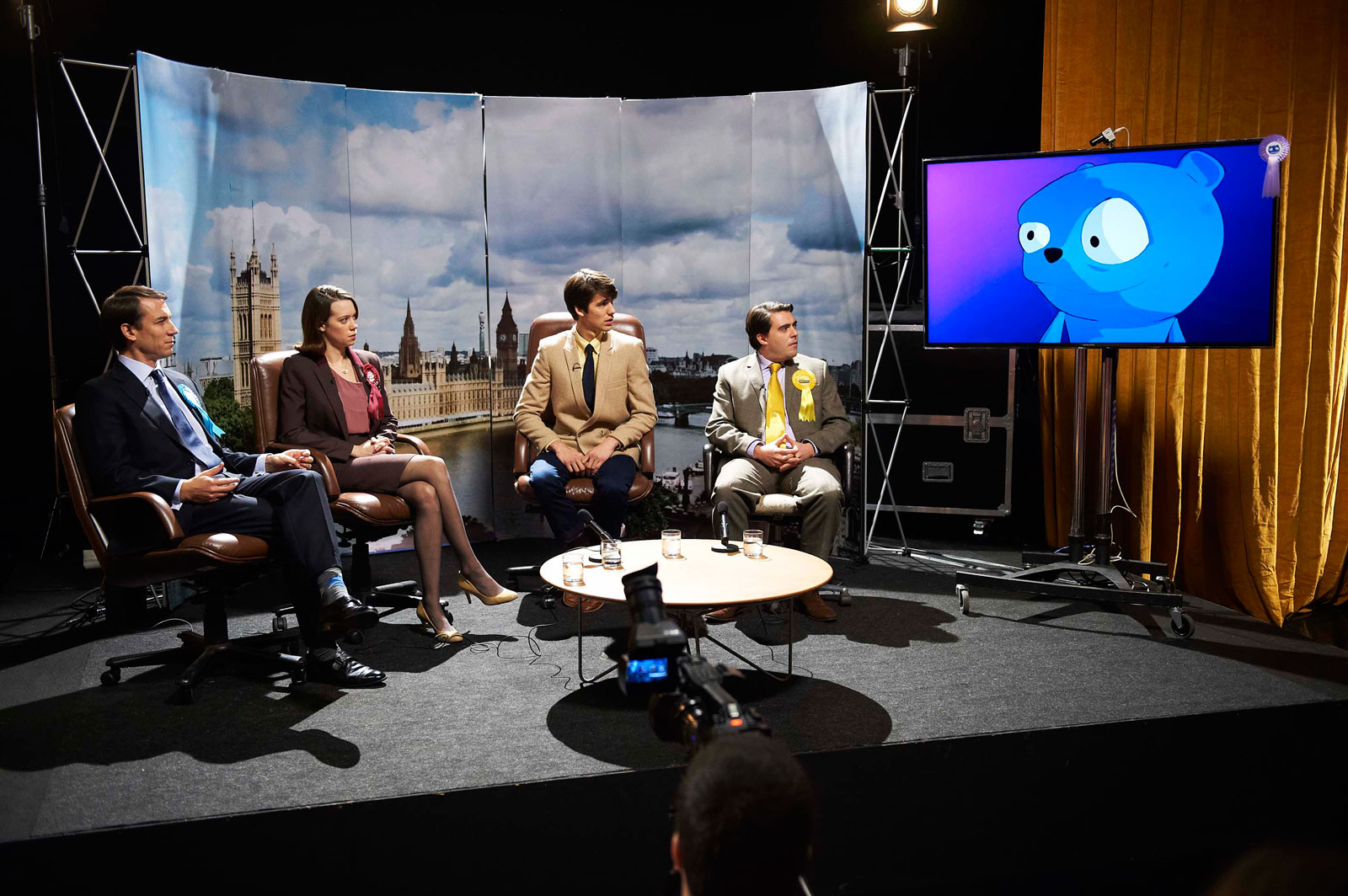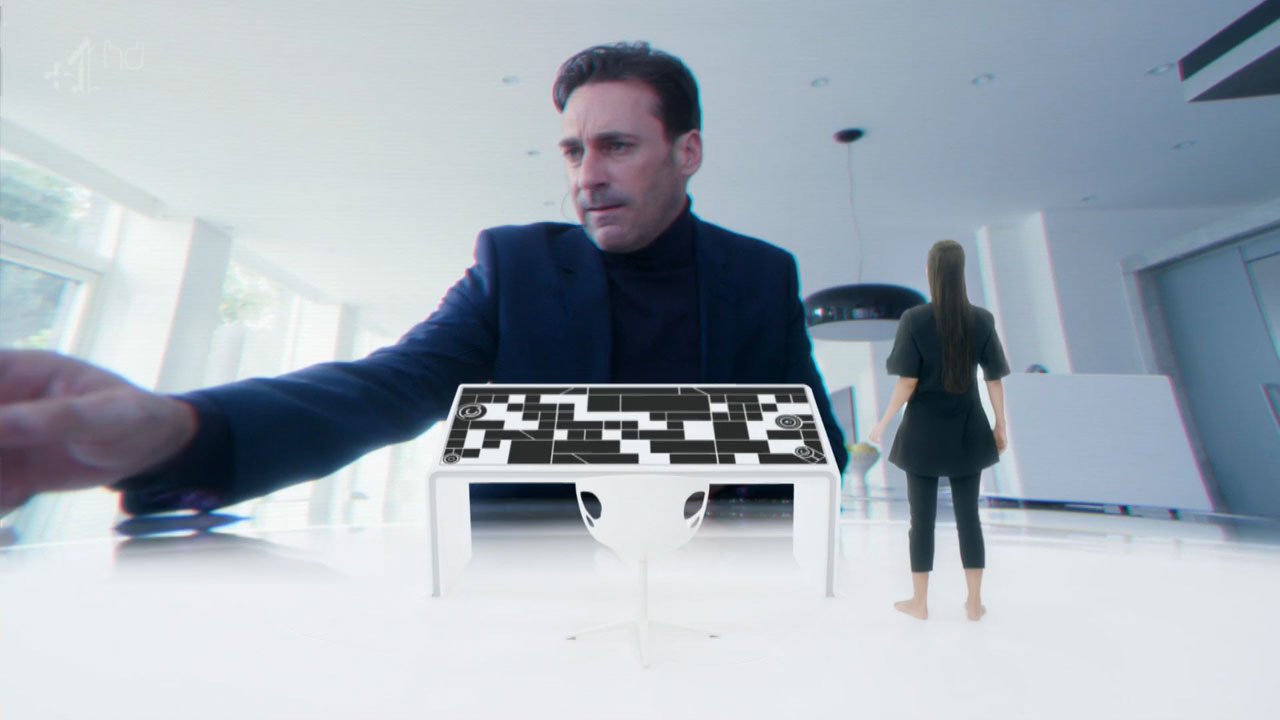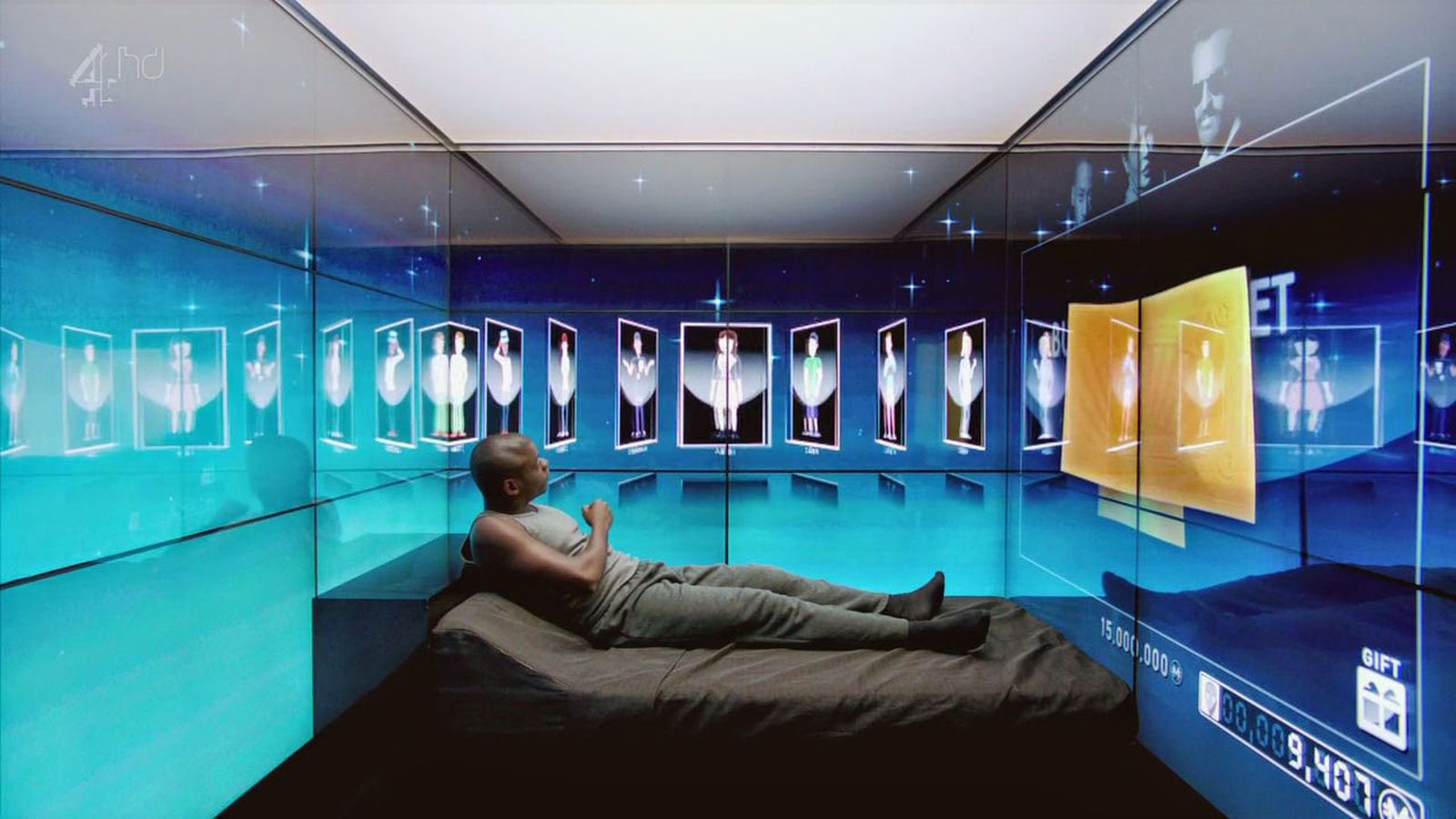Except for CNN and Fox News, the British science-fiction series Black Mirror may be the scariest thing on TV. Created by Charlie Brooker, the show, now about to go into its fourth season, is a succession of dark little dramas, each set in a fantastic but all too plausible near future. One episode in particular has attracted attention for its almost bizarrely prescient, even predictive portrayal of a future that has turned out to be far more imminent than its creators could have imagined.
In “The Waldo Moment,” which was first aired in 2013, an angry, aggressive, foul-mouthed blue cartoon bear, fond of penis and fart jokes, enters a local race for member of parliament. The bear’s facial expressions, gestures, and dialogue are improvised by a despairing failed actor named Jamie. Waldo gets popular by insulting rival candidates and by fanning populist rage against snooty, uncaring, professional politicians who “don’t give a shit about anyone outside their bubble.” Waldo goes into politics partly to boost his TV ratings and partly because of a personal beef with the Tory candidate, who appears on Waldo’s television show and who, like celebrity guests who appeared on Da Ali G Show before people figured it out, is suckered by the cartoon bear into looking humorless and self-important. Playing to the crowd, slinging bipartisan insults and bullying both candidates during a televised panel that serves as a sort of debate, Waldo mocks and discredits the entire political process—one of a number of ways he creates an atmosphere of aggression that helps inspire and sanction mob violence. Watching all of this, as I did the other night, you can hardly avoid thinking: this is what happened in the 2016 election. We are living in the Waldo moment.
Each episode of Black Mirror is a different length, with a fresh cast of characters inhabiting an invented reality with a new set of customs, rules—and the latest gadgets. Ingeniously cast, with suspenseful and often complicated plots, the episodes vary in tone from horrific to comic, but most share certain themes: advanced technologies run horribly amuck, our culture’s obsessive love affair with electronics, and the exploitation of conflict, suffering, and embarrassment as a source of mass entertainment. The series, Brooker writes in The Guardian, is about “the way we might be living in 10 minutes’ time if we’re clumsy.” He writes, “If technology is a drug—and it does feel like a drug—then what, precisely, are the side-effects?… The ‘black mirror’ of the title is the one you’ll find on every wall, on every desk, in the palm of every hand: the cold, shiny screen on a TV, a monitor, a smartphone.”
In one of several plot lines woven through one feature-length episode, “White Christmas,” a glib charmer (Jon Hamm, best known for playing Don Draper on Mad Men) who is skillful at manipulating people by creating alternate realities is put to work extracting confessions from suspected criminals. In “The Entire History of You,” a lifetime can be recorded on a memory chip implanted behind one ear, so that people can replay the past in their minds, fast-forwarded or reversed. In “The National Anthem,” the outcome of a kidnapping and ensuing hostage crisis depends on the British prime minister’s willingness to have sex with a pig on national television. “Be Right Back” posits a world in which technological advances have made it possible to outwit death, but, as always happens in such stories, immortality comes at a high price. And in “Playtest,” an American in London is hired to try out a new video game that works by discovering and amplifying each gamer’s private terrors.
Viewers may at times be reminded of Rod Serling’s The Twilight Zone, an influence that Brooker credits. But this new descendant of the early Sixties TV series (which was revived in the Eighties and the early 2000s) takes advantage of some of the same new technologies and cultural shifts it satirizes; it’s filmed in radiant color and high definition, with more sex and a much larger production budget than its predecessor. Like many of Serling’s plots, some of these mini-plays have surprise endings that explain the mysterious events we have watched. But the episodes that end with a startling “reveal”—“White Bear” and “Shut Up and Dance,” among others—may strike us as being among the hokier segments, more contrived and consequently less persuasive and darkly monitory.
In “The Waldo Moment,” the cartoon bear says, “I may not be real. But I’m realer than you,” and the crowd roars its approval. After Waldo comes in second in the campaign, beating the Labor Candidate but losing to the Tory, he becomes “a Twitter sensation,” such a viral phenomenon that he is approached by an American “from Washington” who works for an entity referred to only as The Agency. In another inspired casting decision, the Agency recruiter is a sleek, super confident black man (David Ajala), intelligent, amoral, possibly lethal and slightly robotic. What’s chilling about the Agency pitch is how closely it resembles the tone and substance of Donald Trump’s presidential campaign. Waldo would be “the perfect political figurehead… We always know he’s not real. He’s a team… At the moment, he is anti-politics, which is a political stance in itself, right? He could deliver any political content without the potential downsides of a human messenger… In a debate your team could Google every word the other guy says, then let Waldo hit him with debunk stats and spit a Twitter-ready zinger into the next sentence. He’s the perfect assassin… With a targeted hopeful message which we of course can provide, energizing the disenfranchised without spooking the middle, via your new platform, you’ve got the global political entertainment product people actually want… You could roll this out worldwide.” South America is a promising market. Does Waldo happen to speak Spanish?
Advertisement
In September 2015, journalist Chris Cillizza, writing on the Washington Post blog, noted that Donald Trump, whose attention was, at that point, mostly focused on hectoring Jeb Bush, bore a striking resemblance to the loutish, vulgar cartoon bear in Black Mirror. “Waldo has no qualms about using profanity, lewd jokes and all sorts of non-PC behavior to win verbal sparring matches with his opponents. Those traditional pols have no idea how to handle Waldo because he is, well, a made-up bear. Waldo loses, but his impact on the public—and against politicians—is huge.” Two months before the election, Waldo’s creator, Charlie Brooker, predicted Trump’s victory. “I find it fucking terrifying” he told a reporter, ”because I think Trump’s going to win… Hello, we just went through Brexit! Of course Trump’s going to win.”
“The Waldo Moment” is among the most unnerving of Black Mirror’s portrayals of a future that closely parallels the present, but it’s by no means the only unsettling episode. Set in the world of gladiatorial TV, of programs like America’s Got Talent and American Idol, entertainments that traffic in mean-spirited take-downs and public mortification, “Fifteen Million Merits” explores what can happen when TV so ramps up its audience’s hunger for sadism and sensation that the most extreme desperation can be commodified and marketed. Another episode, “White Bear,” reveals what crime and punishment might look like if the criminal justice system were to be reconceived as an interactive theme park. The spectacle of the soldiers in “Men Against Fire” dispatched to exterminate grotesque humanoids referred to as “cockroaches” seems even more horrifying when we recall that the same word was used by the Hutus to refer to Tutsis in the weeks leading up to the genocide in Rwanda.
One of the more cautionary mini-dramas is entitled “Nosedive.” In the society it depicts, everyone is obsessed with their online approval ratings. People walk with their smart phones always at the ready so they can take flattering selfies in attractive and enviable situations; they can locate, swipe, and rate (from one to five stars) co-workers, coffee shop baristas, and strangers they pass in the street. A high rating allows tenants to receive a discount on luxury housing, and a minimum ranking is required before an airline will change a passenger’s reservation after a flight has been canceled.
Not only do these scores confer social status, but they have become an indicator of self-worth, and for the hapless, insecure heroine, Lacie (Bryce Dallas Howard), the pressure to be nice and pleasant, and to avoid offending anyone who might give her a low ranking, becomes intolerable. The episode, like several others, features memorable cameo appearances by famous and increasingly well-known actors; here, Cherry Jones plays a tough, friendly truck driver, while Michaela Coel, writer and star of her own Netflix series, Chewing Gum, appears briefly as a maddeningly unsympathetic airport employee. Anyone who has ever checked, or even noticed, the number of “likes” that a post on social media has received may feel a disquieting twinge of recognition on seeing how maniacal the search for online popularity can become, and how easily it can take the place of authentic human interaction.
Advertisement
Watching Black Mirror at bedtime is, I’ve discovered, unwise. The situations it portrays, the anxiety it inspires, and the adrenaline that it generates seem to worsen the insomnia that I have been fending off (and that a number of friends have reported experiencing) ever since the election. How could it not keep us awake: our sense that science fiction has become a plausible representation of our everyday reality, combined with our growing fear that the imagined dystopian future may be increasingly hard to distinguish from the times in which we live.
Black Mirror Seasons 1-3 are available on Netflix.





